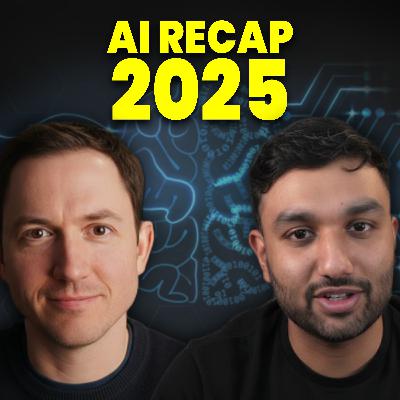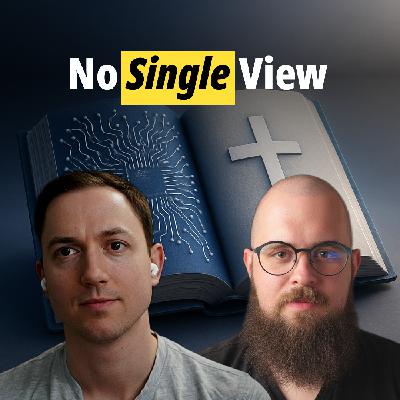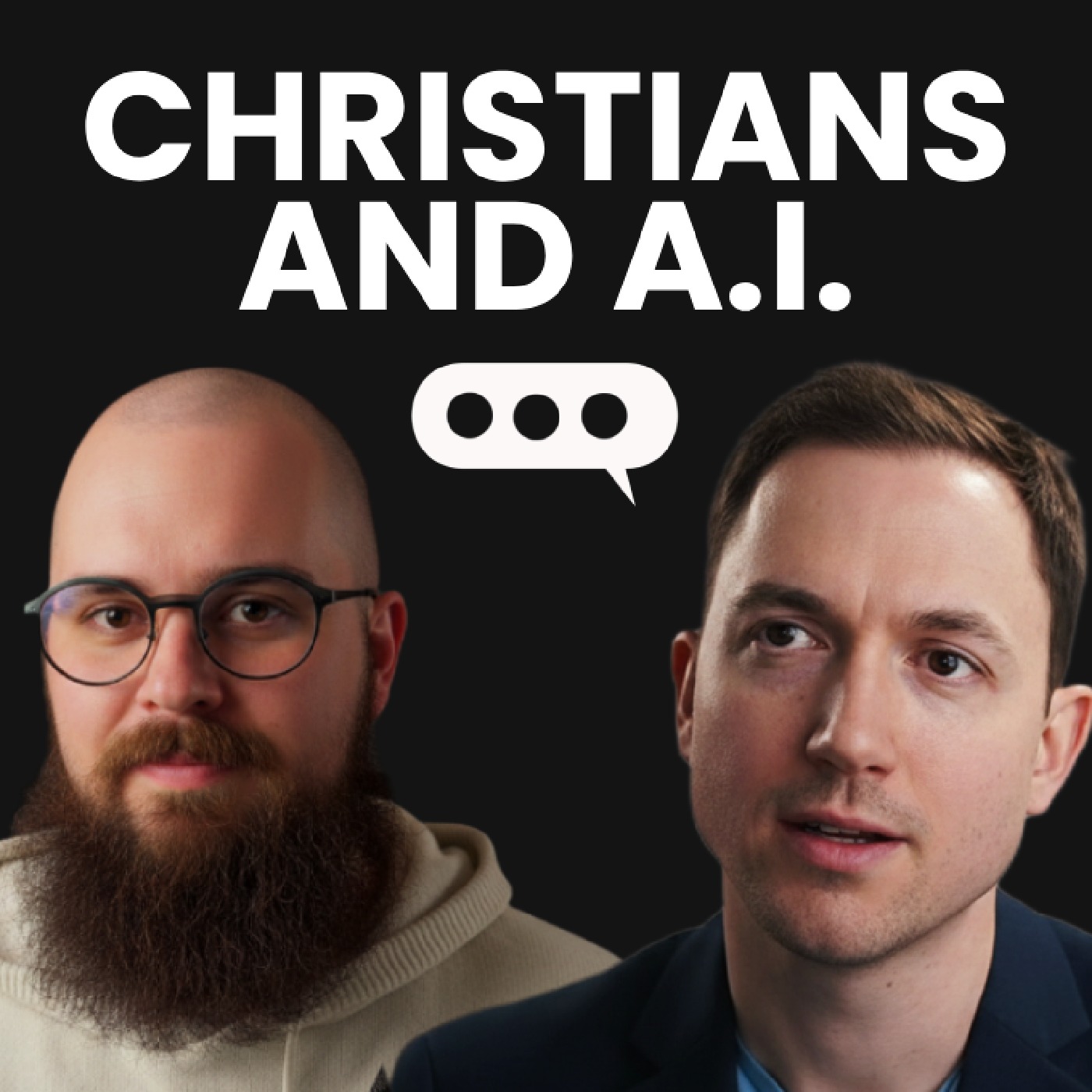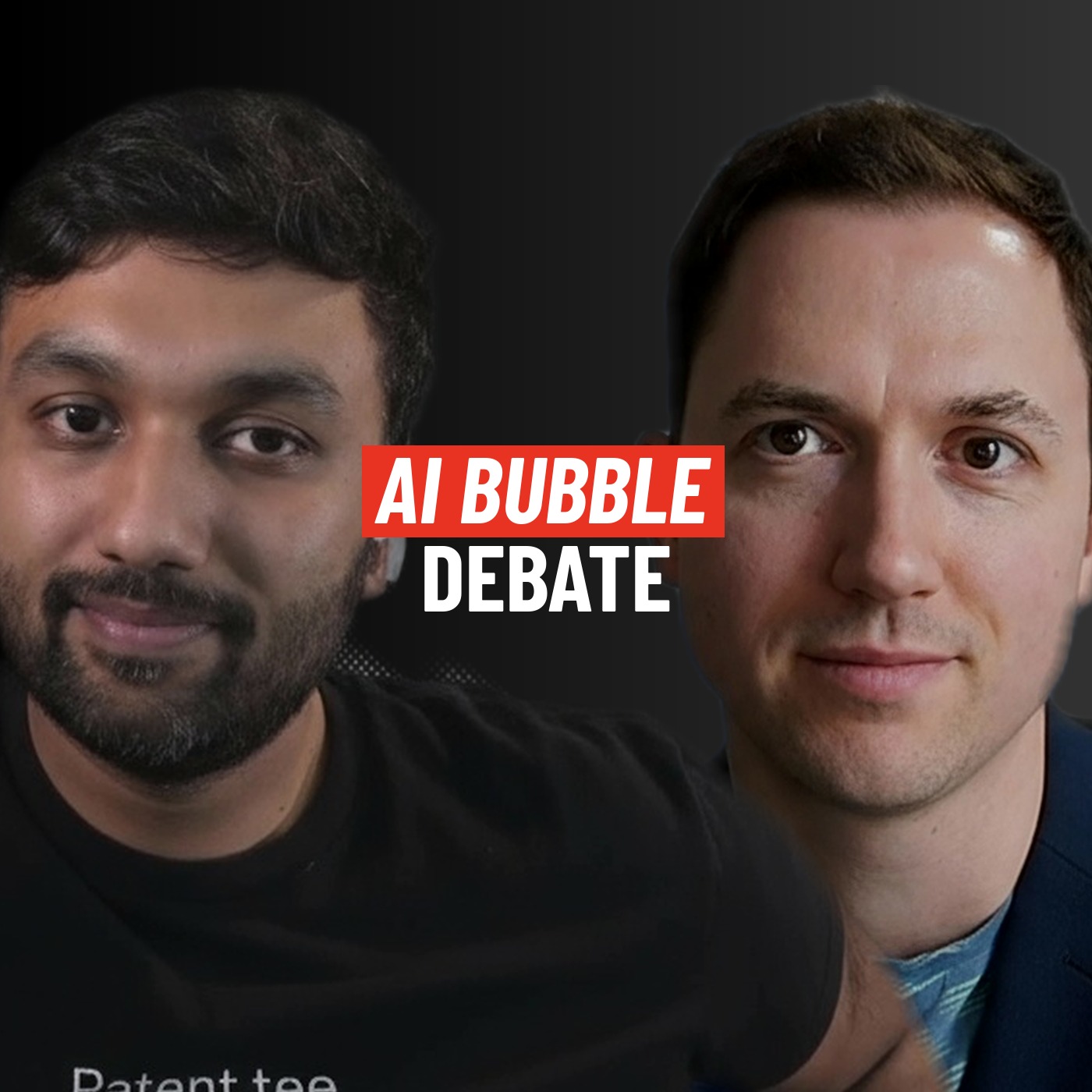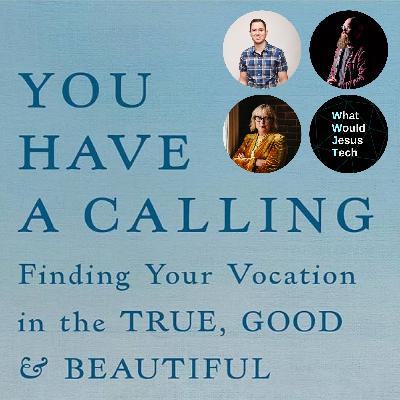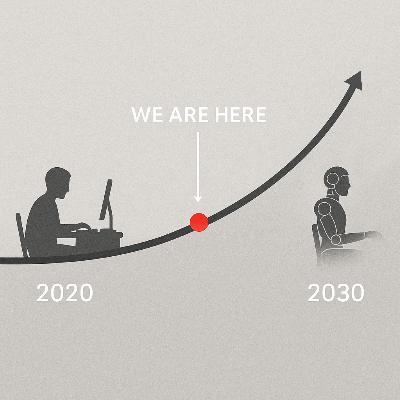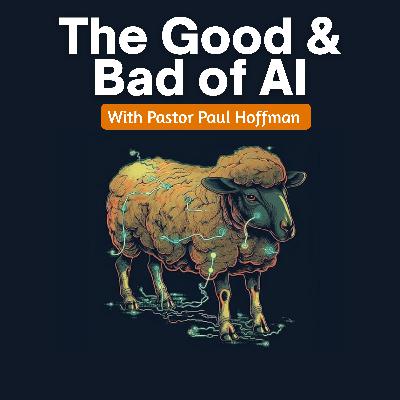Discover What Would Jesus Tech
What Would Jesus Tech

What Would Jesus Tech
Author: Andrew Noble, Austin Gravely, and Joel Jacob
Subscribed: 8Played: 64Subscribe
Share
© All rights reserved.
Description
We exist to help Christians use tech, find rest, and glorify God.
Join Joel Jacob (Product at Splunk), Austin Gravley (Pastor), and Andrew Noble (PhD Student at Nottingham) as they interview leading theologians and technology experts and grow in their ability to imitate Jesus in a digital age. Our primary audience is Christians working in technology, as well as Christian leaders (pastors, parents, youth leaders, etc.).
Support us - https://www.patreon.com/WWJT
100 Episodes
Reverse
2025 has been a crazy year for AI. Today, we delve into some of the biggest changes, takeaways, and how our predictions held up over the year. AI has deep implications in our lives, and looking back on the past year shows just how much of an impact AI has had.Chapters0:00 Intro2:25 The Current State of AI24:27 AI Agents & Other Current Technologies36:28 The Phone and Social Media Shift43:36 The Rise of AR Glasses46:42 Evaluating Predictions and Future TrendsSupport Us on Patreon: https://www.patreon.com/WWJTOur Instagram: https://www.instagram.com/whatwouldjesustech/Our Discord: https://discord.gg/JXTfcSRwCohosted by Andrew Noble, Joel Jacob, and Austin Gravley. Original Music by Abigail Neale. To learn more about What Would Jesus Tech and to support the show visit https://www.whatwouldjesustech.com/
Education and reading are changing rapidly in a world full of AI growth. Today, we offer perspective on how to navigate the challenging conversation around reading and education in a society where new technology is ever growing and ever changing.Sign Up for the Course Here: https://www.andrewnoble.net/p/im-teaching-a-course-on-technologyChapters0:00 Intro7:17 AI in Education15:58 Reading in the Age of AI25:33 Historical Perspectives on Christian Engagement with Technology29:24 The Role of Seminary Education in Technology Literacy34:39 The Importance of Moral Theology in Pastoral TrainingSupport Us on Patreon: https://www.patreon.com/WWJTOur Instagram: https://www.instagram.com/whatwouldjesustech/Our Discord: https://discord.gg/NVtkqDN9Cohosted by Andrew Noble, Joel Jacob, and Austin Gravley. Original Music by Abigail Neale. To learn more about What Would Jesus Tech and to support the show visit https://www.whatwouldjesustech.com/
Lots of Christians have strong opinions on technology. But perhaps one of the strongest is the opinion that there is no perfect Christian view on technology. This episode Joel and Austin question Andrew’s thoughts on this perspective, its validity, and its practicality.Chapters:0:00 - Intro2:15 - There is No One Christian View of Technology7:47 - Categories of Theological Triage12:45 - The Role of Technology in Christianity15:35 - Mere Christianity and Core Beliefs20:36 - Current Issues in Christianity and Technology32:06 - The Body of Christ and Diverse Views on TechnologySupport Us on Patreon: https://www.patreon.com/WWJTOur Instagram: https://www.instagram.com/whatwouldjesustech/Our Discord: https://discord.gg/NVtkqDN9Cohosted by Andrew Noble, Joel Jacob, and Austin Gravley. Original Music by Abigail Neale. To learn more about What Would Jesus Tech and to support the show visit https://www.whatwouldjesustech.com/
In this episode, we explore how the Advent calendar and technology work together. We dive into the implications of Christ's incarnation for technologists, the importance of waiting in the context of both faith and technology, and how active waiting can shape our actions during the Advent season. Ultimately, this episode highlights the deeper meanings of Advent and how it can inform our technological pursuits.Andrew's Course: https://www.andrewnoble.net/p/im-teaching-a-course-on-technologyChapters00:00 Intro02:39 Advent's Significance and Background05:31 The Relationship Between Advent and Technology16:49 The Importance of Waiting in Technology and Faith28:15 The Active Posture of Waiting37:16 Resources for Active Waiting during Advent40:12 An Atheist Perspective on Motivated Reasoning in AGISupport Us on Patreon: https://www.patreon.com/WWJTOur Instagram: https://www.instagram.com/whatwouldjesustech/Our Discord: https://discord.gg/NVtkqDN9Cohosted by Andrew Noble, Joel Jacob, and Austin Gravley. Original Music by Abigail Neale. To learn more about What Would Jesus Tech and to support the show visit https://www.whatwouldjesustech.com/
The first big consumer humanoid robot is here! It's called Neo and it is equally impressive as it is frightening. This provokes the big question - how should we as Christians respond? Today, we sit down and approach this topic in a way that is rooted in the Bible.Chapters:0:00 - Intro1:53 - Discussion on Neo and Skepticism4:54 - Criticisms of Robotics12:26 - The Difference Between Humans and Robots17:29 - Economic Implications35:12 - We Test a Live AI ExperimentResources:Neo's Official Website - https://www.1x.tech/Support Us on Patreon: https://www.patreon.com/WWJTOur Instagram: https://www.instagram.com/whatwouldjesustech/Our Discord: https://discord.gg/NVtkqDN9Cohosted by Andrew Noble, Joel Jacob, and Austin Gravley. Original Music by Abigail Neale. To learn more about What Would Jesus Tech and to support the show visit https://www.whatwouldjesustech.com/
How Should Christians Talk About AI? In this episode, we discuss how to gracefully (in loving kindness) and truthfully (without compromise) approach conversations about AI as Christians. We must seek to be thoughtful, be human, and be like Jesus.Resources from this EpisodeAI Goes to Church: https://www.thegospelcoalition.org/reviews/ai-goes-church/AI Shepherds and Electronic Sheep: https://www.amazon.com/Shepherds-Electric-Sheep-Artificial-Intelligence/dp/1540968014/ref=sr_1_1?adgrpid=186932244416&dib=eyJ2IjoiMSJ9.yiAo3cs5Rm3hfJwjP409gg.sm5-TNqA08TbX0uzh3Flq_7W_JA5dWlBf4m8Rj69U4g&dib_tag=se&hvadid=779581857802&hvdev=c&hvexpln=0&hvlocphy=9026810&hvnetw=g&hvocijid=10188755072419422323--&hvqmt=e&hvrand=10188755072419422323&hvtargid=kwd-2407784283755&hydadcr=22592_13821282_8484&keywords=ai+shepherds+and+electric+sheep&mcid=38aa2f2b67a937c4a8a880eabbe5c96f&qid=1762754941&sr=8-1Robot Theology: https://www.amazon.com/s?k=robot+theology&crid=2A029BHNSV0RD&sprefix=robot+theology%2Caps%2C275&ref=nb_sb_nossChapters0:00 - Intro0:45 - Welcome and Overview5:06 - Christian Perspective on AI21:00 - A Critique and Reflection39:01 - What is the Current Era of AI?Support Us on Patreon: https://www.patreon.com/WWJTOur Instagram: https://www.instagram.com/whatwouldjesustech/Our Discord: https://discord.gg/NVtkqDN9Cohosted by Andrew Noble, Joel Jacob, and Austin Gravley. Original Music by Abigail Neale. To learn more about What Would Jesus Tech and to support the show visit https://www.whatwouldjesustech.com/
Should humans be like God? Of course, yes! In what way? Should we adopt new technologies for the sake of transforming our bodies into a new techno-humanity? Some call this transhumanism, and according to our guest, Wyatt Graham, to understand transhumanism we must understand Fredrich Niche. In this episode we navigate the difference between becoming God and becoming like God, receiving our humanity rather than altering it.Wyatt Graham is the editor-in-chief for The Gospel Coalition Canada and an Adjunct Professor at various schools, including Redeemer University. Follow him on his Substack: http://wyattgraham.com/Chapters00:00 Introduction to Transhumanism and Theosis02:33 Understanding Theosis03:27 Defining Transhumanism06:05 The Intersection of Technology and Humanity10:20 Restoration vs. Augmentation14:09 The Role of Death in Human Existence19:13 Theosis vs. Transhumanism23:27 The Nature of Love and Humanity28:30 Cultural Implications of Transhumanism33:11 The Future of Technology and HumanitySupport Us on Patreon: https://www.patreon.com/WWJTOur Instagram: https://www.instagram.com/whatwouldjesustech/Our Discord: https://discord.gg/NVtkqDN9Cohosted by Andrew Noble, Joel Jacob, and Austin Gravley. Original Music by Abigail Neale. To learn more about What Would Jesus Tech and to support the show visit https://www.whatwouldjesustech.com/
This AI moment isn't exactly the dot com boom, but is it close? Many think so, including people working at leading at AI companies. In this episode, not only do Joel Jacob and Andrew examine the reality of our AI Bubble, and how valuation is outpacing reality, but also the deeper values driving this bubble. We are also joined by a special guest at the end of the episode, who tells us we did an excellent job. Chapters:00:00 Intro03:27 Understanding Market Bubbles, Dot Com and Railroads12:34 Circular Investments15:47 Spiritual and Existential Inflation18:40 Evaluating AI's Real Value and Potential Value32:10 Moving Fast and Breaking Things36:46 Yes, It's Kind of a BubbleSupport Us on Patreon: https://www.patreon.com/WWJTOur Instagram: https://www.instagram.com/whatwouldjesustech/Our Discord: https://discord.gg/NVtkqDN9Cohosted by Andrew Noble, Joel Jacob, and Austin Gravley. Original Music by Abigail Neale. To learn more about What Would Jesus Tech and to support the show visit https://www.whatwouldjesustech.com/
The Keller Center (a part of TGC) has conducted an important benchmark of seven leading AI models. These are the seven most used models in the world, and they do not give the same answers to theological questions. In fact, a Chinese model (Deepseek) had the top score.The Director of the Keller Centre, Michael Graham, joins us in this episode to share how AI models respond to theological questions and the implications for Christians. The conversation touches on the future of AI in pastoral care and the ethical considerations that arise as technology continues to evolve.Chapters00:00 - Intro01:25 - Cultural Apologetics05:51 - Evaluating AI Responses to Theological Questions20:27 - Missiological Implications of AI in Christianity for Pastors31:11 Understanding AI's Limitations and Human Involvement38:12 Engaging with Silicon Valley: A Christian PerspectiveRead the report for yourself: https://christianbenchmark.ai/Cohosted by Andrew Noble, Joel Jacob, and Austin Gravley. Original Music by Abigail Neale. To learn more about What Would Jesus Tech and to support the show visit whatwouldjesustech.com
Do tech leaders believe in God?What are the reasons why they tend to believe in what is material, but not what is immaterial? Is there anything beyond matter to an engineer in a secular age? When you've been trained on analyzing the nature of things, you struggle to consider a thing of supernature. Perhaps this is what has happened.Sam Altman, CEO of OpenAI (ChatGPT), says he views the world as a tech-nerd, and therefore, in his own logic, he does not believe in spiritual things. Elon Musk is similar, as a clip in this episode shows. And just wait till you hear what Steve Jobs said! We all need God. And he's more real than we realize.00:00 - Intro3:00 - Why enchantment? What secular age?14:00 - Sam Altman's lack of belief20:45 - Elon Musk and the sensus divitatis31:29 - Steve Jobs, "there must be more"35:12 - We are NOT less enchantedWe're hiring! If you're interested in becoming the WWJT Podcast Manager, please see job description and application process here: https://x.com/AndrewDNoble/status/1971207236455420089Books cited:Charles Taylor – A Secular Age (2007)The foundational 800-page philosophical work on how belief in God shifted in modernity.James K. A. Smith – How (Not) to Be Secular: Reading Charles Taylor (2014)A short, accessible summary and engagement with Taylor’s A Secular Age.Alan Noble – Disruptive Witness: Speaking Truth in a Distracted Age (2018) Applies Charles Taylor’s framework to technology, culture, and Christian witness.Tony Reinke – God, Technology, and the Christian Life (2022)A biblical theology of technology; argues all technology should point us back to awe and gratitude toward the Creator.Joseph Minich – Enduring Divine Absence: The Challenge of Modern Atheism (2017)Explores the modern sense of God’s absence and how to live faithfully amid it.Walter Isaacson – Steve Jobs (2011)The definitive biography of Steve Jobs, including his reflections on death, the afterlife, and transcendence.Gray Sutanto – A Sense of the Divine: An Affective Model of General Revelation from the Reformed Tradition (2025)A scholarly work building on Calvin, Herman Bavinck, and J.H. Bavinck on the “sense of the divine” (sensus divinitatis).Original Music by Abigail Neale. The Thumbnail was created in Sam Altman's and OpenAI's GPT-5. AI audio text-to-speech by ElevenLabs.What Would Jesus Tech? is cohosted by Andrew Noble, Joel Jacob, and Austin Gravley. To learn more about What Would Jesus Tech and to support the show, visit whatwouldjesustech.com
Is this trend something to be happy about? Many are seeing psychedelics as an "on-ramp" to pagan spiritualism *and* to Christianity. Psychedelics include LSD, psilocybin (found in magic mushrooms), DMT (found in ayahuasca), and mescaline (found in Peyote and San Pedro cacti). While various ethical concerns may be noted, there are also some apparent medicinal benefits. Is there room for nuance here? Or should we, as Christians, reject psychedelics completely?Phil Cotnoir is a husband, a father of four, an avid reader, and a freelance writer and editor. He recently wrote:- The Coming Psychedelic Moment at Mere Orthodoxy- The Psychedelic Renaissance: A Story of Hype and Hubris at The Gospel CoalitionKeywords: psychedelics, technology, spirituality, Christianity, mental health, conversion stories, tech culture, ethical research, medicinal use, recreational use. Thumbnail generated with the help of ChatGPT.To learn more about What Would Jesus Tech and to support the show visit whatwouldjesustech.com
Yes, there is talk of demons controlling AI. Why wouldn't they? Why wouldn't they use Generative AI tools like ChatGPT, Gemini, and Claude to influence humanity?And yet, we shouldn't go too far when thinking about their control. They are subordinated and limited by God. In this episode, we explore the intersection of spiritual warfare, demons, and artificial intelligence. We get into some personal experiences with demonic influences, and the theological framework needed when thinking about AI demons.00:00 Intro01:02 Yes, Demons in 202503:06 Limits and Influence of Demons10:02 Physical Objects13:51 The Nature of Idols, Demons, and AI17:39 Cultural Phenomena and Spirituality23:29 Power and Providence35:33 Rebuking DemonsSupport the show at patreon.com/WWJTPlease send your ideas and feedback to the cohosts, Andrew Noble, Austin Gravley, and Joel Jacob, at whatwouldjesustech@gmail.com. Thumbnail: original image created by Colton Sturgeon on Unsplash with edits made by ChatGPT. Original Music by Abigail Neale. To learn more about What Would Jesus Tech and to support the show visit whatwouldjesustech.com
Doing AI Right?Daniel Manary has held various roles in AI, including CTO of PlaySpace, CTO at Kenesense.AI, Machine Learning Engineer at ProNavigator, and CTO at SimulFit Technologies, among others. He is also the host of Artificial Insights, a podcast where he interviews AI Product Leaders to seperate hype from impact.In this episode, Andrew Noble sits down with Daniel Manary, host of Artificial Insights, for a conversation that blends faith, technology, and the future. Together, they explore the hidden motivations driving AI, the ethical questions we can’t afford to ignore, and the surprising ways AI might reshape human connection. From Daniel’s inside perspective in the AI industry to a distinctly Christian vision for technology, this episode asks: can AI be built with both brilliance and a moral compass?00:00 - Intro03:05 - Dan had a dream05:00 - How you build matters11:12 - What AI future should we care about most?17:33 - Optimistic about AI? Why?20:53 - Current AI Projects and Future Directions30:00 - Wrap Things UpCheck out Dan's podcast: Artificial Insights: How To Do AI Right.Connect with Dan Manary on LinkedIn.Please send your ideas, questions, and feedback to the cohosts, Andrew Noble, Joel Jacob, and Austin Gravley, at whatwouldjesustech@gmail.com. Original Music by Abigail Neale. To learn more about What Would Jesus Tech and to support the show visit whatwouldjesustech.com
Our guest today explores what it means to be ourselves truthfully. That is, true to our calling - our true, good, and beautiful callings.In this episode of What Would Jesus Tech? we delve into the concept of vocation beyond traditional job roles with our esteemed guest, Dr. Karen Swallow Prior. An award-winning author and cultural commentator, Karen shares insights from her latest book, "You Have a Calling," exploring how vocation intertwines with truth, goodness, and beauty.We discuss the evolving nature of work, the impact of technology, and how to find purpose in a rapidly changing world.Karen Swallow Prior is an award-winning author and cultural commentator who writes at the intersection of faith, literature, and public life.Buy her book! Link to Baker Publishing Group. Link to amazon.com.00:00 - Intro02:15 - Calling as Vocation10:30 - Calling vs Passion18:45 - AI and Job Shifts Due to Tech27:00 - Integrating Truth, Goodness, and Beauty in Our Work35:20 - Addressing Modern Challenges and Anxieties in VocationKaren's Substack: https://karenswallowprior.substack.com/Thanks for listening. On behalf of me, Andrew Noble, and the rest of the team, we appreciate you taking the time to think more deeply about what it means to imitate Jesus in our technological age. You can support our podcast by sharing it with friends, writing a review, or going to our Patreon page and becoming a member. I do use Generative AI to help write the episode description and create the chapters. This last paragraph however, was written completely by me. Hence the unnecessary length, incomplete sentences, and abrupt ending.
Smart glasses are in your churches. What should you do?In this episode, we explore the evolution of smart glasses, the need for churches to have policies in place regarding their use, and the importance of balancing accessibility for individuals with visual impairments against the need for privacy and safety, especially for children. The conversation also touches on the cultural acceptance of smart glasses, the future of this technology, and the necessity for churches to prepare for potential risks associated with it.Chapters00:00 Introduction to Smart Glasses in Churches04:57 The Importance of Having a Plan08:47 Privacy Concerns and Policies16:04 Balancing Accessibility and Safety22:26 Preparing for the Unexpected26:00 Conclusion and Call to ActionImages used in the thumbnail include:- https://www.ray-ban.com/Join us on Discord - https://discord.gg/P3pMnAkjSupport us on Patreon - https://www.patreon.com/WWJT
We discuss the challenges and joys of being a dad during the summer. Part two on Patreon. We explore the balance between technology use and outdoor play, the importance of being present with children, and creating memorable experiences. The conversation emphasizes the significance of presence over perfection in parenting, especially during the summer months when schedules can be more relaxed. (And yes, the thumbnail for this is based on Bluey and created by ChatGPT)Chapters00:00 Summer!03:12 Screen Time06:07 Balancing Freedom and Structure (Patreon)09:08 Presence (Patreon)16:03 Adventures (Patreon)Support us on Patreon - https://www.patreon.com/WWJTHave a great summer!
Sam Altman, the founder of ChatGPT, believes we're past the event horizon. We're past the point of no return. The future is an AI future. And, well, Andrew Noble and Joel Jacob mostly agree. But with some important caveats related to AI safety, deterministic versus probabilistic coding, determinism philosophically, and agency amidst rapid technological advancements.Chapters00:00 Intro02:28 AI Defense and Security07:47 The Gentle Singularity13:43 The Deterministic vs. Instrumentalist View of Tech22:46 Probabilistic vs. Deterministic Coding in AI25:31 Evaluating AI's Performance, Ethics, and Impact31:34 Finding Hope in the AI AgeLinks - Sam Altman on A Gentle Singularity- Using GenAI helps consultants: - ChatGPT May Be Eroding Critical Thinking Skills, According to a New MIT Study Keywords: AI, Artificial Intelligence, OpenAI, Sam Altman, technology, singularity, ethics, job displacement, security, human values, deterministic, probabilisticSupport the show: https://www.patreon.com/WWJT
"AI is a tool, not a partner."As more people use AI tools like ChatGPT, how should Christian leaders respond? On one hand, there are opportunities to leverage Artificial Intelligence as a tool for human flourishing. But we should also be cautious about its potential to diminish human connection and creativity. They discuss the need for engagement, the importance of community, and the role of the Christian faith despite the allure of transhumanism.Cohosts Andrew Noble (PhD Student Theology & Technology), Joel Jacob (Principle Product Manager at Splunk), and Austin Gravley (TGC Social Media Manager) discuss a new book by Sean O'Callaghan and Paul Hoffman: AI Shepherds and Electric Sheep: Leading and Teaching in the Age of Artificial Intelligence.Buy the book: AI Shepherds and Electric Sheep: Leading and Teaching in the Age of Artificial IntelligenceChapters00:00 Intro02:35 The Journey to Writing the Book05:41 Engaging with AI as a Tool vs Partner17:10 Navigating AI in Ministry32:54 Understanding AI Limitations and Risks38:14 Reclaiming Our HumanityJoin our discord.Support us on Patreon.Keywords: AI, technology, human flourishing, theology, ministry, relationships, creativity, community, digital age, Paul Hoffman
"God purposefully designed humans to have limits and depend on one another." Why is it so hard to believe this?Theologian Kelly Kapic discusses this with us in his new book, You Were Never Meant to Do It All: A 40-Day Devotional On The Goodness of Being Human. Cohosts Andrew Noble and Austin Gravley ask Kapic about human limitations, depending on one another, and the balance between work ethic and rest. They discuss the importance of community and the significance of physical touch in a technological age.Buy the book! Link: https://bakerpublishinggroup.com/books/you-were-never-meant-to-do-it-all/406045Earlier episodes with Kelly Kapic:- discussing Kapic's You're Only Human ("Limits") - and the Tyranny of TimeChapters00:00 Intro01:40 Understanding Human Limits09:57 "Balance"15:00 Technology and Human Limitations21:55 Touch26:57 Self-Optimization28:43 Love31:43 Stress35:54 Community42:51 PlaceCohosted by Andrew Noble, Joel Jacob, and Austin Gravley. Original Music by Abigail Neale. To learn more about What Would Jesus Tech and to support the show visit whatwouldjesustech.com
How should Christians navigate various faith and technology organizations? Some are Universities. Others are non-profits you can volunteer with. The three cohosts chat with Corey Hickson on the intersection of engineering education, technology, and growing your faith. They explore the role of Christian universities in shaping future engineers, the impact of AI on education and work, and the importance of integrating faith into the tech space, even if you don't work at a Christian company! The conversation also touches on the challenges faced by Christians in technology, the need for community, and the significance of viewing work as a form of worship.00:00 - Intros and Background to Dr. Cory Hixson of Colorado Christian University04:25 - Be a generalist! And Christian Universities for Technology?12:10 - Exploring Christian Tech Orgs & The Ecosystem of Faith and Technology20:44 Worship Through Work in Engineering25:30 - You Don't Have To Join a "Christian" Org!30:15 - Parachurch Tech Orgs?36:17 - Faith and Work Integration in Tech39:04 - Supporting Engineers in Their Faith Journey44:09 - The Future of Technology and Human InteractionJoin our discord: https://discord.gg/u3vMQ45wSupport us: https://www.patreon.com/WWJTKeywordsengineering education, Christian universities, AI impact, faith and work, technology integration, Christian organizations, future of work, community in tech, worship through work, engineering careersCohosted by Joel Jacob, Andrew Noble, and Austin Gravley. Original Music by Abigail Neale. The image was created with the assistance of ChatGPT. The show notes were written with aid from Riverside's AI. To learn more about What Would Jesus Tech and to support the show visit whatwouldjesustech.com


